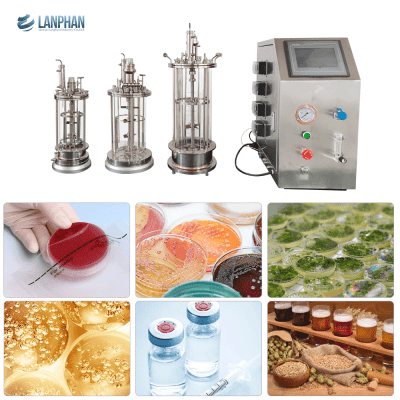Introduction
Bioreactors are essential technological tools widely employed in biotechnology, pharmaceuticals, the food industry, environmental protection, and more. They provide a controlled environment for nurturing, maintaining, and regulating biological systems to facilitate various biochemical processes. This article will introduce the fundamental principles of bioreactors, their main components, and their crucial applications in various fields.

Fundamental Principles of Bioreactors
1.1 Definition of Bioreactors
A bioreactor is a device or system used to support and control biological processes, where biological entities such as microorganisms, cells, or enzymes undergo growth, metabolism, and reactions within a controlled environment.
1.2 Operating Principles of Bioreactors
The core principle of bioreactors is to establish a controlled environment, including parameters like temperature, pH levels, oxygen concentration, and nutrient supply, ensuring that the desired biochemical reactions occur under optimal conditions.
Main Components of Bioreactors
2.1 Vessel
Bioreactors typically consist of a sealed vessel used for containing biological materials and culture media. The design and scale of the vessel can vary according to the specific requirements of the application.
2.2 Control System
Bioreactors are equipped with a control system responsible for monitoring and regulating various parameters within the reactor. This includes temperature control, pH control, oxygen supply, agitation speed, and nutrient addition, among others.
2.3 Agitation Device
Agitation devices are employed to mix and evenly distribute biological materials and culture media, ensuring adequate gas exchange and nutrient supply.
2.4 Gas Supply System
Gas supply systems can provide oxygen or other gases within the bioreactor to meet the atmospheric requirements of the biological process.
2.5 Sensors and Monitoring Equipment
Bioreactors are equipped with various sensors and monitoring devices for real-time tracking of parameters within the reactor, facilitating timely adjustments to control parameters.
Applications of Bioreactors
3.1 Pharmaceutical Production
Bioreactors are widely used in the pharmaceutical industry for the production of biopharmaceuticals, such as monoclonal antibodies and protein-based drugs.
3.2 Biofuels
Microorganisms are employed in bioreactors to ferment and produce biofuels, such as bioethanol and biodiesel, reducing dependence on fossil fuels.
3.3 Food Industry
Bioreactors are used for yeast fermentation in the food industry, contributing to the preparation of products like yogurt, beer, and sauces.
3.4 Environmental Protection
Bioreactors play a crucial role in wastewater treatment and environmental biotechnology, breaking down and degrading organic waste and pollutants to purify water sources and reduce environmental pollution.
3.5 Enzyme Production
Bioreactors are utilized for the large-scale production of enzymes, which are essential in various industrial and scientific applications.
Conclusion
Bioreactors are indispensable tools in modern biotechnology and engineering, serving critical roles in various applications, from drug production to environmental conservation. As technology continues to advance, the design and performance of bioreactors will improve, providing new opportunities and challenges in a broader range of application fields. A comprehensive understanding of the principles and applications of bioreactors enables us to harness this key tool for advancing the frontiers of biological science and engineering.
